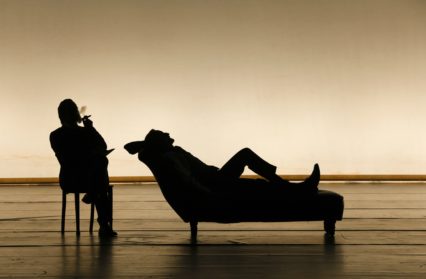Steph Power shares her opinions on the Welsh National Opera’s productions of Shakespeare’s Macbeth and The Merchant of Venice.
Shakespeare’s life in England happens more or less to have coincided with the birth of opera in Italy around the turn of the 16th century. What he and his proto-baroque counterpart, Claudio Monteverdi, might have created in tandem had fate brought them together is a fascinating question. In the event it has fallen to later composers to plunder the Bard’s dramatic treasure for the operatic stage.
One of the first and still most famous to do so was Purcell, whose The Fairy-Queen, based on A Midsummer Night’s Dream, premiered in 1692. The piece takes the form of a masque or ‘semi-opera’ to a largely spoken text by an anonymous author, who ‘modernised’ Shakespeare’s words for a contemporary audience; just one example amongst countless others through operatic history of how a composer and librettist – or in modern times a stage director – might ‘up-date’ or otherwise adapt elements of an existing work to fit some creative purpose at hand.
Since Purcell, composers of all kinds have composed hundreds of operas using Shakespeare’s words and stories. But none to date has shone brighter than Giuseppe Verdi, who is said to have first encountered the plays in clumsy Italian translation. Far from putting the composer off, it whetted his appetite for this astonishing explorer of the human condition; equally at home with high tragedy and low farce, couched in diverse settings from the grandly public to the intimately domestic; often all within the same play, and switching from one mode to another with dizzying, poetic virtuosity.
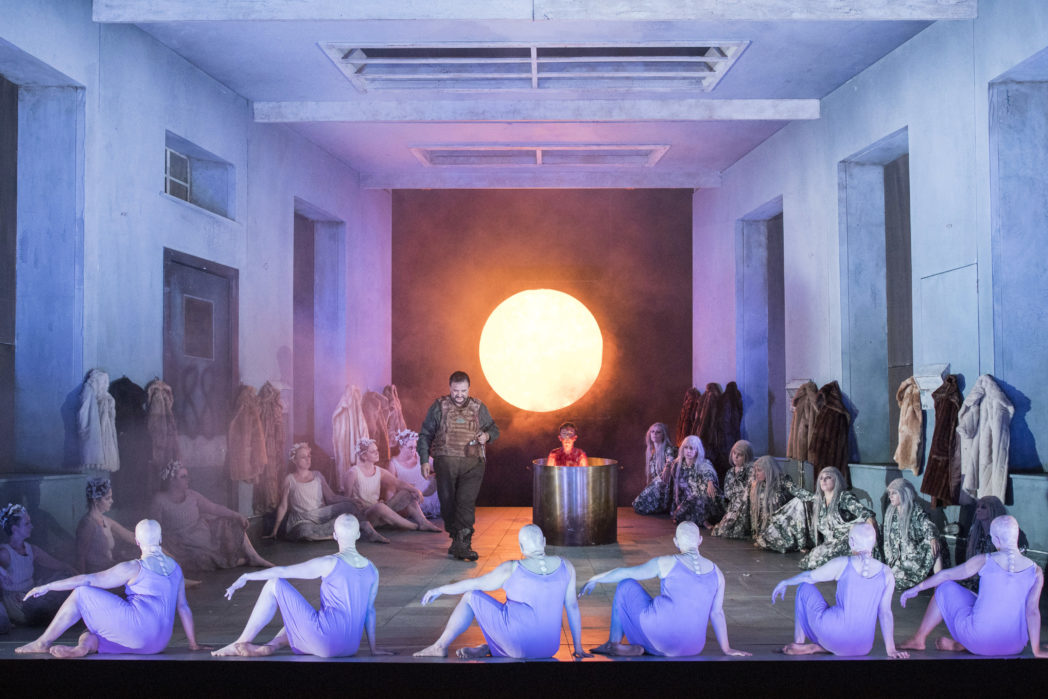
In Verdi’s opinion – and who would disagree? – Macbeth is ‘one of mankind’s greatest creations’. It was the first of three Shakespeare plays that he adapted, here with the assistance of librettist Francesco Maria Piave, and unleashing a creative zeal which took him – and quite possibly opera itself – in radical new directions; he was later to comment, for instance, on Wagner’s move away from aria-based opera that ‘I too attempted to blend music and drama in my Macbeth … but unlike Wagner I was not able to write my own libretti.’ Perhaps such approval of the icon of Bayreuth might surprise those determined to paint 19th-century German and Italian operatic culture in simplistic opposition. In any case, Verdi’s music-dramatic ‘Scottish play’, and especially the far later Otello and Falstaff (with librettist Arrigo Boito; the latter opera based on The Merry Wives of Windsor and scenes from Henry IV, Parts 1 and 2), would prove testament to a composer who not only came close to Shakespeare’s genius, but who arguably matched it in his own terms. If only his projected King Lear had come to fruition by the time he died in 1901.
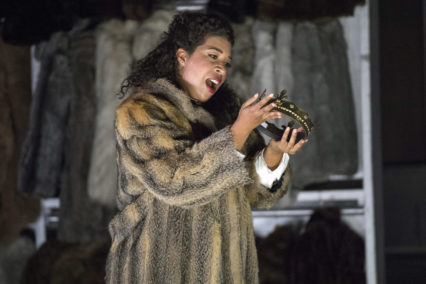
Rewind some considerable years, Verdi’s Macbeth was written in 1847 and revised in 1865. The opera is usually presented in its later, more musically mature guise, but director Oliver Mears has chosen to combine elements of both versions in his production for Welsh National Opera, first seen at Northern Ireland Opera in 2014 (where he is artistic director, now director-in-waiting at the Royal Opera House). My only quibble was the loss of the stupendous 1865 final chorus; especially since WNO’s chorus members proved of all the cast in Cardiff most chillingly adept at ‘opening the jaws of hell’, to paraphrase Lady Macbeth.
Vocally and dramatically, the women’s Chorus of Witches is central to the opera; indeed Verdi considered them to be a third protagonist, dividing them into three groups which command the stage whenever they appear. They also prove crucial to Mears’ potentially powerful – ‘up-dated’ – concept of the piece. Framed within a dystopian, warring future-past, his Witches are gruesomely malformed in body and soul; not just ‘unsexed’ in fiendish association with Lady Macbeth, but brutally dehumanised. And not through sorcery, but as victims of some crime against humanity perpetrated in the name of tribal fealty this side of the phantasmagoric divide.
Mears’ vision is of a blasted, battle-weary world in which brute survival and sectarian violence go hand in hand. En pointe for his home company, there are shades of the Northern Ireland troubles lurking within a wider, baby-dismembering horror. The geo-political echoes reach further still: to Scotland (Saltires, Lions Rampant, kilts and pipers set within a semi-destroyed Glasgow tenement); to unidentified Mitteleuropean apocalypse (a video of dreadful war scenes in grainy black and white); to gangland culture (a men’s chorus of street thugs in trackies and bobble hats); to the corruption and inequality of Ceaușescu’s Romania and Marcos’s Philippines (Lady Macbeth’s furs and shoes, adding warped femininity to her lust for power).
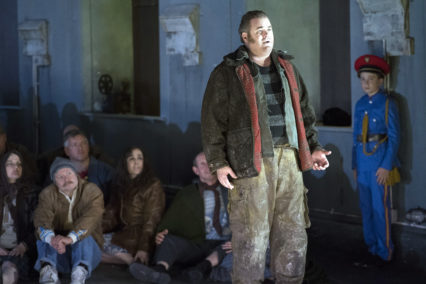
God knows the current Philippines incumbent would make for a terrifying Macbeth. But then, in both play and opera it is of course Macbeth’s wife who exudes the truly repellent machismo, and who is more ruthlessly driven to act – or, at least, through furious scorn drive her man to do so. In his characterisation, Mears stays true to Verdi / Shakespeare, and his production has all the makings of a psychologically complex reading of the piece – if it were not (on the opening night at least) for over-long scene changes which drained the tension, and Luis Cansino’s weak portrayal of the eponymous anti-hero (‘Macbetto’ in the text).
Alas, the tenor’s stiffness of voice and demeanour went beyond any supposed theatrical intent, and he was outclassed by soprano Mary Elizabeth Williams as the murderous harpy-cum-wretched somnambulist, Lady Macbeth. Notwithstanding her compelling sleep-walking scene and other solo highlights, her charisma and disturbing vocal beauty had nowhere to go (interestingly, Verdi once rejected an attractive-looking soprano for the role, rather wishing Lady Macbeth to be ‘ugly and evil’, and her ‘voice to have something of the diabolical!’). More crucially, the lack of chemistry between the co-conspirators denied us the psychopathic sexual obsession which should juxtapose the banality of evil at the heart of the piece.
Conductor Andriy Yurkevych did not always help, although his tendency to flatfooted tempi and phrasing were overall trounced by the outstanding musicians of the WNO orchestra, whose playing was characteristically cinematic in colour and emotional sweep. Of other cast-members, Banquo was portrayed with darkly impressive heft by Miklós Sebestyén, whilst Bruce Sledge’s eloquent Macduff brought a welcome depth of passion to the stage.
******
Thoughts of Verdi may be bittersweet with the ‘if only’ of his projected Lear, but it is a matter of genuine regret that André Tchaikowsky only got to write one opera before his premature death from cancer in 1982, aged just 46. Moreover, it is an opera full of promise, rooted in deep, personal suffering – and one that he never got to see following its rejection by English National Opera on grounds of a too-full schedule. Years later, director David Pountney returned to the score and resolved to stage it, commissioning Keith Warner’s elegant, Edwardian/Weimar Germany-set production for the world premiere at Bregenz Festival in 2013. Now that production has come to the UK with WNO.
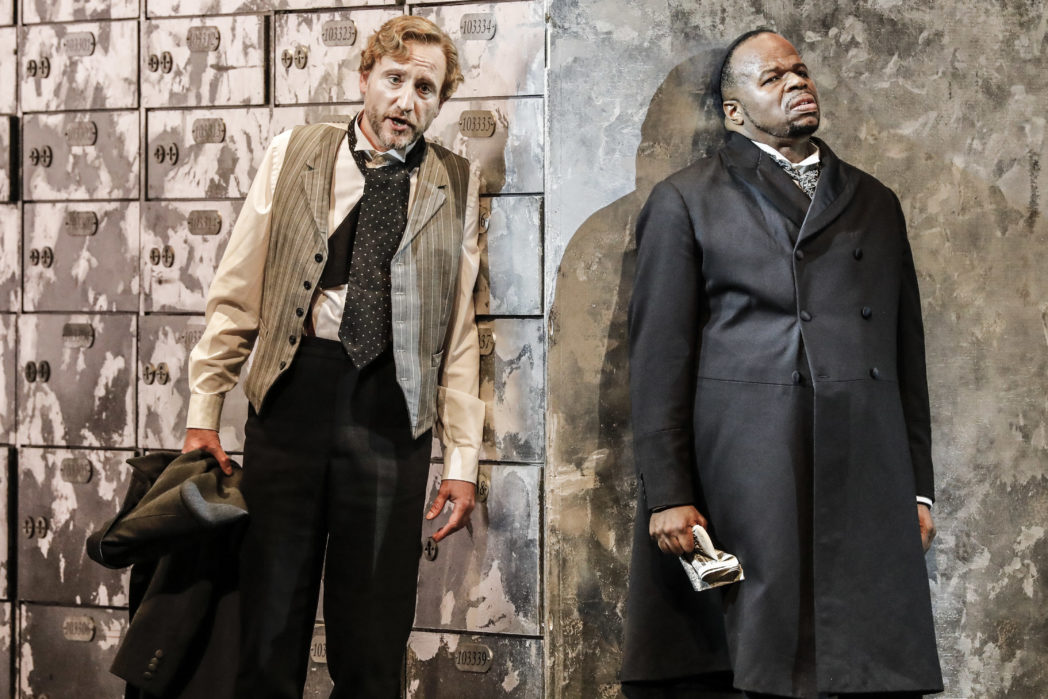
Tchaikowsky was a brilliant but troubled pianist-composer, whose childhood escape from the Warsaw ghetto hardly signalled an end to trauma. Rescued by his grandmother, who changed his surname, Krauthammer, to a Czajkowski he found pressure-laden, he later found out that the mother he lost to murdering Nazis at Treblinka had not abandoned him as he’d believed, but had stayed behind that he might safely flee. Jewish, and openly homosexual, prejudice and political danger dogged Tchaikowsky’s footsteps upon his return to a now communist Poland at the end of the war. There he found the social demands and faux celebrity of life as a concert pianist intolerable, and eventually he settled in England where he managed to sustain a career despite alienating colleagues and audiences with his mood swings and rude behaviour. His real love was composing – and Shakespeare, to the extent that he bequeathed his skull, of all things, to the Royal Shakespeare Company, where it has most recently appeared in Hamlet, brandished by actor, Neil Tennant. It was The Merchant of Venice, however, to which he turned for an opera libretto, with the help of writer, John O’Brien.
The choice of that particular play might seem odd, given its savage, stomach-turning anti-Semitism. Understandably, many people today cannot bear to see it (and, oh, how we all long for Shakespeare to always reflect what we fondly believe to be our own, tolerant humanist values). Yet through acute, subtle awareness of the play’s ambivalence – and exploiting the sympathetic elements of Shakespeare’s portrayal of the Jewish moneylender, Shylock – Tchaikowsky raises a powerful voice against the oppression and mistreatment of outsiders.
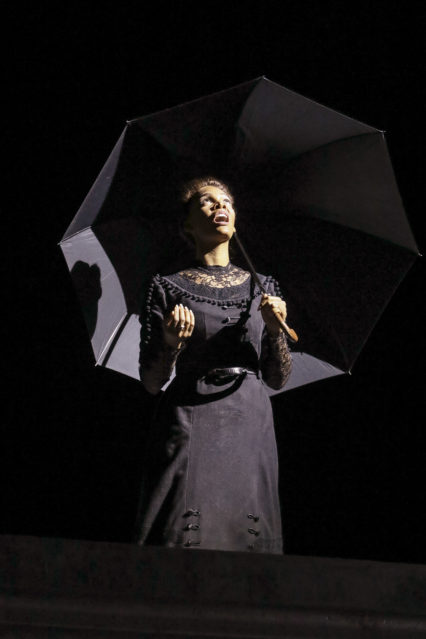
It is not the abused and vengeful Shylock through whom Tchaikowsky himself looms largest, but his anti-Semitic and – in Keith Warner’s insightful, sensitive yet oft-bawdy production – his gay and tragic nemesis, Antonio. There may be traces, too, of Tchaikowsky in Jessica; the daughter whom Shylock locks away in an attempt to enforce conformity to his values, but who escapes, stealing his jewels and her mother’s ring. In an horrendous stereotype to modern-day eyes, Shylock is mocked for appearing as distraught at losing his wealth as he is his daughter. But perhaps it is no accident that Shakespeare should point a comparison with gentile mercantilism by effectively locking Portia, the Belmont heiress, into a casket as prize for whichever speculator solves a riddle set by her own father.
At any rate, that Jessica should choose a gentile lover, Lorenzo, and to live in this other, brighter world of pleasure is not without irony in the hands of Tchaikowsky, who delineates the two settings very carefully in a complex, lyrical score that is performed with striking expressivity by conductor, Lionel Friend and the WNO orchestra. The music switches in a moment between the dark cruelty of Venice – all pre-Crash wheeler-dealing and safety deposit boxes – and a garden Belmont of love and carefree sexual dalliance, atop the serious business of gambling for a wife and mega-fortune.
Warner steps up the anti-bigotry by casting the black (absolutely superb) singers, Lester Lynch and Lauren Michelle as Shylock and Jessica, with echoes of the KKK in Venetian crowd scenes – not to mention the suggestion of a Shylock-Othello continuum. Hypocrisy, of course, is everywhere, as Shylock’s desire for revenge on his indebted abuser, Antonio, is punished by an act of equally barbarous revenge by Portio in ‘law-giver’ guise (sung by Sarah Castle, at times – and appropriately – more shrewish than any Kate). In a barrage of racism, possibly the worst aspect of Shylock’s humiliation is his eventual sacrifice as a kind of martyr in a mirror-image turning of the tables; forced to become Christian, he is shown no supposed ‘Christian mercy’ by a lynch-mob whose inhumanity both composer and director make no bones in exposing.
Shakespeare’s familiar technique of juxtaposing slapstick comedy and deep tragedy is so often masterful, but seems brittle and problematic in this play, with its long and over-sweet final act grating after the horror of Shylock’s fate. Early on, there are laughs aplenty in this production for those with a taste for clowning innuendo as light relief (and no, it is assuredly not at Shylock’s expense). But rather than cut back the final scene, as most composers would surely do after achieving a courtroom drama of searing intensity as Tchaikowsky does in The Merchant of Venice, the composer and librettist choose to deliver it more or less in full. Whether this is an error of judgement is for audiences to decide. But watching it unfold – and indeed the entire piece – with Tchaikowsky’s clear influences of the Berg operas Lulu and Wozzeck in mind adds layers of fascinating, and very moving association.
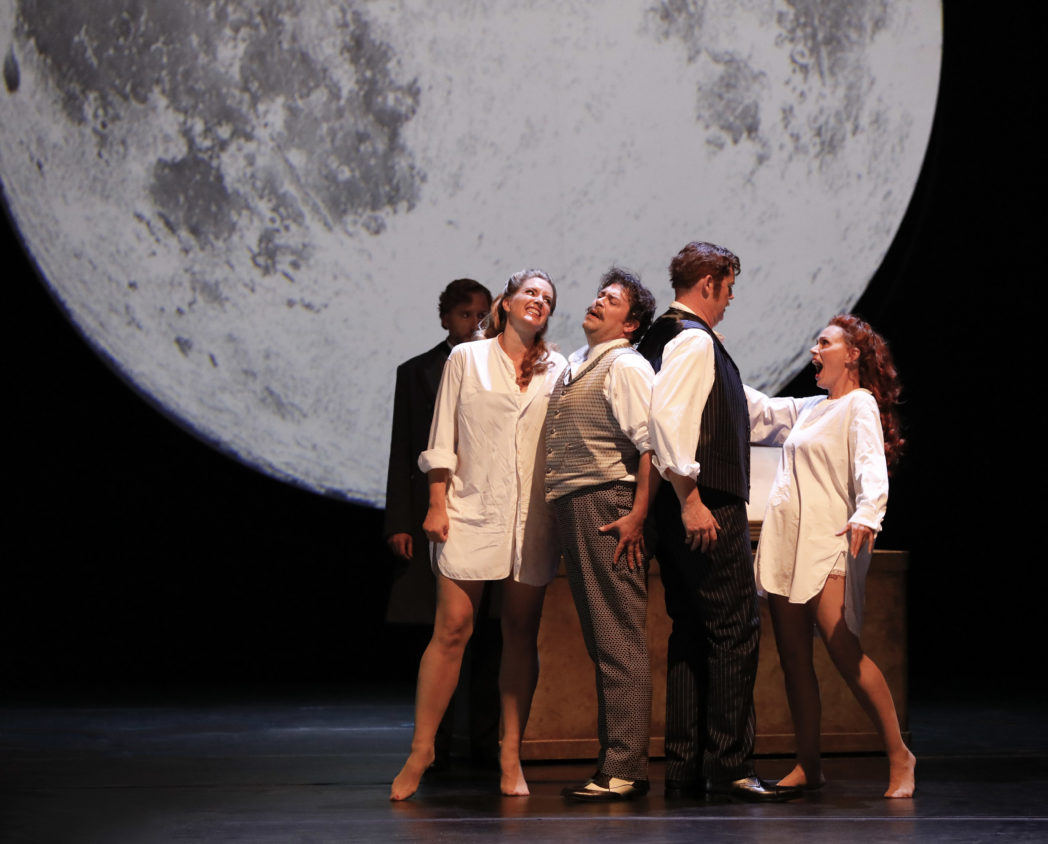
Throughout, the score is saturated with Berg; in texture, colour and emotional heft. There are even rhythmic character and theme motifs in timpani and more à la the Viennese (Britten is key, too, in fanfares and woodwind especially, with quotes and references from a plethora of sources from Wagner and Beethoven to an onstage renaissance consort). Tchaikovsky’s idiom is essentially tonal, albeit chromatic and densely polyphonic, and shows a strong ear for vocal and instrumental placement, deftly handled given the enormous (uniformly excellent) cast. In ensemble terms, the chaos and buffoonery created by Portia’s three successive suitors contains especially uncomfortable echoes of Lulu’s three husbands-cum-clients – whilst the outsider theme inevitably brings the troubled Wozzeck to mind.
Antonio is scored as a thinnish countertenor to Shylock’s resonant baritone – not with great musical success (Martin Wölfel struggled to be audible at times, yet still enacted a powerful Antonio). But the vocal contrast exposes Antonio’s vulnerability and social isolation; clearly in love with Bassanio in both play and opera, here he is bereft at the end of the piece, rescued from violent death only to watch as the three couples share a happiness he is denied. Set-designer Ashley Martin-Davis paints an enormous full moon as backdrop to their final celebration of love. Whether by chance or design, Antonio is left alone on the stage (but for a hovering, ghost-like Shylock), accompanied by music which could have been lifted from the final bars of Wozzeck, where the soldier’s child is found playing, ignorant of his effective abandonment by a murdered mother and, in his case, suicide father (Tchaikowsky’s parents were estranged. He met his father later in life but they fought and never met again). The inference of Tchaikowsky’s own traumatised childhood is plain – and underlines the appropriateness of Warner’s choosing to start and end the opera with Antonio lying on a psychiatrist’s couch: the opera is not so much an expression of Antonio/Tchaikowsky’s emotional pain or psychological working out, as emanating from a sense of almost physical laceration, deep within the composer’s psyche.
The Merchant of Venice is essential viewing; not as ‘great’ opera, which I would not claim on its behalf, but for its many, deeply moving moments of greatness (the courtroom scene, Jessica’s exquisite arias, the ravishing if sometimes overloaded score), and for its wider cultural significance. In pin-pointing the humanity in Shakespeare’s ‘problem’ play, Tchaikowsky has created not only a convincing opera, but, through his own, turbulent relationships with religion, music and humanity at large, he generates at its core a nuanced and timely plea for tolerance and understanding. In doing so he has enriched our understanding of the play, of post-Holocaust art and – dare I suggest – of Shakespeare himself.
Welsh National Opera – #Shakespeare400
Wales Millennium Centre, 10 and 16 September
Macbeth
Music – Guiseppe Verdi
Libretto – Francesco Maria Piave
Director – Oliver Mears
Conductor – Andriy Yurkevych
The Merchant of Venice
Music – André Tchaikowsky
Libretto – John O’Brien
Director – Keith Warner
Conductor – Lionel Friend
Touring Autumn 2016, The Merchant of Venice goes to the Royal Opera House in July 2017
Header image: WNO The Merchant of Venice, credit Johan Persson.
Steph Power is a frequent contributor to Wales Arts Review.


